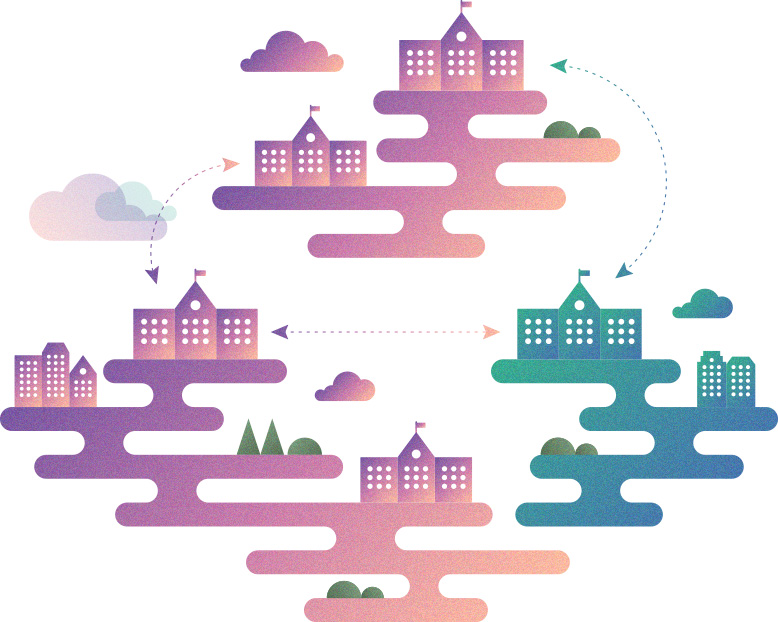2017-2018
![]()
![]()
With the launch of the Canada 150 celebrations, 2017 was a busy year as Canadians across the country celebrated, but also reflected on their history. This coincided with the 50th anniversary of the college systems in Ontario and Quebec, which were both the result of ambitious education reforms. For colleges and institutes, this was an opportunity to reflect on the deep contributions they have made to their communities, while also thinking about the road ahead and focusing on the impact they will have on building the Canada of the future.
At CICan, we embraced this unique opportunity and launched our own Canada 150 national anthology to share the incredible success stories of our members from across the country. These stories resonated strongly with audiences, both at home and abroad, who loved the window into our system’s accomplishments in areas as broad as green spaces and innovation.
With many, if not most, industries facing significant disruption in the years ahead, be it from new technologies or shifting markets, a focus on rethinking the future of skills and innovation was also front and centre this year. Colleges and institutes clearly have a critical role to play in this space and have shown over the years that they are up to the task. In fact, they may just be Canada’s best chance to weather the change and are increasingly being recognized this way by industry and politicians alike.
Though no one can predict the future, we believe this is a great moment for our system to prove the value of our hands-on and employment focused approach to education. These core principles have withstood the test of time and have helped us keep up with changing industries. Thanks to this strong foundation, we are confident that colleges, institutes, cegeps and polytechnics will continue to be leaders in delivering skills for the future.

Denise Amyot, President and CEO

Liane Roy, Board Chair, President and CEO, Collège communautaire du Nouveau-Brunswick
CICan is proud to be the voice of Canada’s colleges and institutes in Ottawa and has worked tirelessly over the past year to ensure their priorities are heard and understood by Canadians and key decision makers.

The celebrations around Canada 150 made 2017 an especially big year in Ottawa. To capitalize on all the attention in the city, CICan organized several events, including our annual conference, in the nation’s capital.
CICan’s Fall Leaders Forum took place October 2-3 in Ottawa with over 60 senior leaders engaging with renowned speakers and government representatives including Stephen Murgatroyd, Chief Innovation Officer at Contact North, Natan Obed, President of the Inuit Tapiriit Kanatami and Mike Moffat, then Chief Innovation Fellow at Innovation, Science and Economic Development (ISED).
CICan also brought its 2018 Applied Research Symposium to Ottawa, February 12-13. With innovation a key priority for the current federal government, the student showcase on Parliament Hill, during which 20 students from colleges and institutes across the country presented their amazing applied research projects to parliamentarians, was a huge success. The event was hosted by Ottawa-Vanier MP Mona Fortier and attracted several members of Parliament, including Minister of Small Business and Tourism Bardish Chagger, who offered opening remarks.

Every year, CICan consults members in order to participate actively in the consultations leading up to the federal budget, to ensure that colleges’ and institutes’ priorities are heard by the government. This year’s recommendations focused on innovation, as well as Indigenous education, apprenticeship completion rates and infrastructure. CEO Denise Amyot, along with NSCC President and CICan Board Member, Don Bureaux, presented these priorities to the Standing Committee on Finance in person during a consultation meeting in Halifax, October 17. This year, we also took the additional step of reviewing CICan’s advocacy cycle to be more aligned with the government’s own budget cycle.
These efforts clearly paid off, as Budget 2018 addressed several of our asks, including an additional investment of $140 million over five years for the critically important College and Community Innovation (CCI) Program.

Over the past year, CICan worked tirelessly to defend the interests of our members on a number of important files.
Copyright: With a review of the Copyright Act underway, we have worked with key partners such as Universities Canada and the Council of Ministers of Education to advocate on behalf of members and their students and ensure the law continues to protect fair dealing provisions.
Experiential Learning : CICan shared a series of recommendations in a Submission to the Standing Committee on Human Resources, Skills and Social Development and the Status of Persons with Disabilities.
Intellectual Property and Technology Transfer: CICan appeared before the House of Commons Standing Committee on Industry, Science and Technology which later published a very positive report.
Work-integrated learning: CICan worked in close collaboration with Polytechnics Canada to encourage Mitacs to fund internships for college and institute students. This led to a pilot expanding the eligibility for their research internship program first presented at the CICan Applied Research Symposium.
Perception audit: In order to improve our advocacy efforts and better understand how CICan and its members are viewed by key stakeholders, we engaged Earnscliffe to conduct a perception audit. Overall, the study showed that people had a positive view of CICan and our members, and identified new areas to focus our outreach.

This past year, when Immigration, Refugees and Citizenship Canada (IRCC) communicated their intention to implement a Study Direct Stream in India, China, Vietnam, and the Philippines (replacing programs like SPP-India and CES-Vietnam), CICan raised our members’ concerns at the highest levels. We are confident the changes to the India program will ensure continued strong recruitment and IRCC’s extension of the CES-Vietnam program will provide the time necessary to adjust to changes. CICan also worked with IRCC officials to help identify facilitative measures for study permit processing in markets across West Africa, Kenya, Brazil, and Colombia.

CICan’s advocacy efforts were supported by a variety of communications activities targeting national and regional media. Over the year, we published op-eds, provided interviews and were featured in media such as the Globe and Mail, HuffPost, Maclean’s, Hill Times, and Le Droit.
We also got creative and advanced our approach to social media campaigns, growing our audience considerably.
Social Media Followers |
|
|---|---|
| % increase (From 2017-04-01 to 2018-03-31) |
|
| 25% | |
| 27% | |
| 33% | |
CICan is dedicated to empowering our members by facilitating a variety of programs and offering services that help them achieve their goals. From representing them on the international stage to providing professional development, our association is always driven by an unwavering commitment to members.

CICan’s 2017 Conference, held in Ottawa from April 30 to May 2, was all about celebration this year. Celebration of 150 years of Canadian history since Confederation, but also of our members’ many successes including a gala to honour the winners of this year’s CICan awards of excellence.
The event was a rousing success, with over 850 participants. Being in the nation’s capital also allowed us to engage directly with parliamentarians. Several took the stage to address delegates and many more were invited to a reception on Parliament Hill with college and institute leaders from across the country. The second annual meeting of CICan’s Government Relations Network was also organized immediately after the conference to discuss specific advocacy priorities.
CICan’s Indigenous Education Symposium, held in Thunder Bay October 26-27, was another opportunity for members to network and discuss best practices. Hosted by Confederation College, the event brought together over 135 people to share and discuss strategies to advance reconciliation and implement the CICan Indigenous Education Protocol.

CICan has a long history of international work, supporting our members in their internationalization goals. To this end, we engage with a variety of partners around the world, including the World Federation of Colleges and Polytechnics (WFCP) where we play a leadership role.
One of the big challenges this year was to help members align with Global Affairs Canada’s new Feminist International Assistance Policy. To this end, we organized sessions during our annual conference, offered webinars and shared our own analysis to help colleges and institutes adapt to the new policy, while advancing gender equality.

CICan launched the brand-new Career-Launcher Internships Program in September. This new initiative provides internship opportunities to new graduates thanks to two different program streams focused on the green economy: Clean Tech Internships, which CICan has been offering since 2015, and the brand new Natural Resources Internships. Both programs are funded by the Government of Canada as part of the Youth Employment Strategy and aim to help recent graduates transition to long‑term employment or pursue advanced studies through hands-on experience and mentorship.
All in all, over 260 new graduates and 175 employers benefited from CICan’s Career Launcher Internships Program in 2017-2018.

2017 was a big year for Canada as it celebrated its long history in which education has played an essential role, with our members profoundly linked to the development of their communities dating back well before confederation. To highlight the contribution of colleges and institutes to Canada, we produced a timeline and a website showcasing success stories from across the country.
Launched in collaboration with our regional counterparts (Fédération des cégeps, Colleges Ontario, BC Colleges, and Atlantic Colleges Atlantique – formerly the Atlantic Provinces Community College Consortium), the project compiled a total of 843 college and institute success stories across 10 categories. A new category in this 150 National Anthology was launched on CICan’s Canada 150 website each month of 2017. By the end of the year, the site had received over 14,000 visits.

This year, CICan’s leadership institutes welcomed more than 150 enthusiastic participants from colleges and institutes across the country. Of the seven programs offered over the summer months, spaces for four of them were filled by early spring and had waiting lists, including the newest institute for applied research and innovation. This brand-new program was specifically designed to address the needs and challenges faced by research directors and staff when taking on leadership roles in this burgeoning area.
CICan also offered 12 different webinars over the year on a wide variety of topics, from gender equality to the launch of CICan’s new Career-Launcher Internship Program. For the first time, we also invited different partners to engage directly with our members via webinars. This included the Canadian Armed Forces, the Social Sciences and Humanities Research Council and the department of Employment and Social Development Canada.

CICan’s Canadian Immigrant Integration Program (CIIP) has a long history of leadership and innovation in the pre-arrival sector but recent developments have had major consequences for its service delivery model. To explore ways of responding to the changed immigrant integration landscape for the next proposal, CIIP convened a college and institute consultation in Toronto, in February 2018. About 35 people, representing colleges and institutes, as well as partners involved in newcomer service delivery took part in the one and half day meeting.
CICan is proud to serve as Canada’s knowledge hub on the college and institute system, gathering data and producing studies to both improve understanding of the Canadian post-secondary sector and support our advocacy efforts, nationally and internationally.

This year, CICan launched the following reports:
Green Skills for Sustainable Economic Growth: The Role of Canadian Colleges and Institutes in Advancing Education for Sustainability in Canada and Overseas.
This report examines the capabilities of Canadian colleges and institutes to contribute to, and partner in, the process of “greening” technical and professional education.
Skills Development as a Means to Women´s Empowerment: Integrating Gender Equality in TVET.
This paper was produced as a part of CICan’s ongoing commitment to engage internationally in thinking about the important points of intersection between gender equality and women’s economic empowerment.
Academic-Employer Connections in Colleges and Institutes: The Role of Program Advisory Committees (PACs)
This study provides a description of PACs, their purpose, governance, structure, and function. It identifies best practices as well as remaining knowledge gaps and offers thoughts on the future of these critical structures.

CICan conducted two major member surveys this year on priority topics. The first one looked at the applied research and innovation activities of our members. The second survey focused on Indigenous education, in order to identify best practices as well as current challenges. This also helped us evaluate the impact of the CICan Indigenous Education Protocol, which has now been signed by over 50 different institutions.
Whether with members, other associations, government or industry, collaboration is at the heart of all of CICan’s activities. With multiple ongoing projects around the world, we were able to create new opportunities for our members this year, thanks to innovative partnerships, both at home and abroad.

Education for Employment (EFE) is CICan’s flagship international program, supporting the development of employment-focused technical and professional training around the world by facilitating partnerships between our members and their international counterparts.
This year, we were proud to support three new programs that are currently at different stages of implementation. This includes the Kenya Education for Employment Program (KEFEP), through which 17 Canadian colleges and institutes have begun working with national polytechnics across Kenya in order to increase employment and economic development opportunities for Kenyan youth in the agriculture and energy sectors. Throughout the year we also worked on the implementation of the new Pacific Alliance Program, and began recruiting members to work with counterparts in Chile, Colombia, Mexico, and Peru. This comes at the same time as the very successful EFE-Andes program was wrapping up after five years. Finally, CICan also secured funding from Global Affairs Canada for the Skills to Access the Green Economy (SAGE) Program, which will see us building on the strong partnerships created through our past EFE program in the Caribbean region.

With support from Scotiabank, we have expanded our recruitment activities in several countries, including the Philippines, where we were involved in the launch, last June, of the Study Direct Stream (SDS) Program.
This new initiative helps streamline the study permit application process for Philippine residents looking to study in Canada, with Scotiabank providing eligible students the opportunity to purchase a Guaranteed Investment Certificate (GIC) to satisfy the financial statement requirements of the SDS. This partnership also led to the creation of a new internship program in collaboration with Scotiabank’s Digital Factory in Mexico City, which began in February as a pilot project.
The CICan/Scotiabank Global Mobility Program allowed two Canadian students to embark on a 12 week, fully funded internship, gaining valuable work experience in an international context. Initiated in 2016 for one year, CICan and Scotiabank have agreed to extend their fruitful and mutually beneficial partnership until 2020.

Canada has a long history of collaboration with Brazil in post-secondary education. With a large Brazilian delegation taking part in CICan’s 2017 annual conference, it was the perfect time to announce a new initiative to encourage Canadian students to pursue a cultural international experience in Brazil. The Canada-Brazil Outbound Student Mobility Program offers bursaries of up to $5,000 each to Canadian college and institute students to offset some of the costs related to travelling and living in Brazil. Six students are currently completing the 2-month program.
2017 also saw the launch of the Canada-Brazil Scholarship Program for the North region (CBSPN) which was built upon the success of the 2016-2017 Canada-Brazil Scholarship Program. The program allows two students from the Northern region of Brazil to pursue language training, post-secondary studies, and an internship at Canadian colleges and institutes.

We were thrilled to conclude the training phase and initial evaluation of our ground-breaking Essential Skills Social Finance (ESSF) project, which ended on a very positive note. The project was the first of its kind to leverage social impact bonds in order to finance essential skills training for vulnerable and unemployed Canadians. That initial training phase, which was offered by Douglas College, Saskatchewan Polytechnic and Confederation College, concluded this year with 88% of participants achieving measurable skills improvements.
This positive outcome allowed the private investors involved to recuperate 96% of their original investment. The success of this outcome-based public-private partnership approach also marks an important step for the Government of Canada, as well as impact investors, not-for-profit organizations, and other governments seeking to develop programs with measurable social impact for Canada’s most vulnerable populations.

Like its members, CICan has always favored a collaborative approach when tackling complex issues. This year we were proud to continue working with many partners, including:
As a member-focused association, CICan is committed to adopting governance and management practices that will help us function in the best interest of our members by using evidence-based decision-making. This concept was front and center this year as we implemented new processes to improve governance and overall efficiency within the association.

Supporting the internationalization of members has been a critical part of CICan’s mandate for the past four decades. In order to continue playing that role efficiently, we embarked this year on a thorough review of our international activities to develop a strategy that meets the needs of members, while reflecting changes in federal policies, industry needs, and general trends in the international post-secondary environment. The process included consultations with members, as well as a review of past and current projects.
CICan’s new international strategy was launched in January and builds on a strong tradition of championing education, training and innovation on a global scale while looking to meet the diverse needs of Canada’s colleges and institutes. Under the new strategy, we will adopt a clearly targeted approach to pursuing business opportunities using key themes as filters and identifying a limited number of regions of focus. We will also seek to diversify sources of project funding.

Last June, CICan became one of the first national associations in the country to organize an exclusively online annual general meeting (AGM). Embracing new technologies, we were able to make the meeting more accessible to members by removing the need for costly travel expenses. Over 110 people, representing members from across the country, participated in the meeting.
The AGM was also the opportunity to appoint new board members. We were pleased to welcome Don Bureaux, president of NSCC, Yves Galipeau, director general of Cégep de la Gaspésie et des Îles, and Maggie Farrington, CEO of the Athabasca Chipewyan First Nation, to the CICan Board of directors.

With our current strategic plan expiring in 2019, we began an ambitious and wide-ranging consultation process to reflect on the association’s value proposition, priorities, and objectives.
Launched in March, the Imagine the Future campaign will involve CICan staff, members, partners, and stakeholders in the preparation of our next strategic plan for 2019 to 2024. This will be achieved through round table discussions, face to face meetings, and a series of workshops across the country. To facilitate this process, we have retained the services of Blueprint Management Consultants.

To ensure that CICan policies, programs and services also reflect the needs and realities of our francophone members, CICan conducted a consultation process with members both in and outside Quebec, followed by the creation of an advisory committee to address issues related to membership, value added services and advocacy priorities.
The committee met for the first time on October 12, and two more times after that, to discuss issues related to CICan membership, bilingual services, and advocacy priorities.
The committee is composed of representatives from the following institutions: Cégep de Matane, Cégep de Jonquière, Cégep de Saint-Jérôme, Cégep de Victoriaville, Collège Boréal, and Heritage College.

CICan has been an ISO 9001 certified organization since 1997, but this year we embarked on a review of internal processes and policies in order to align them with the more recent ISO 9001:2015 requirements. To that end, we adopted a new quality policy and trained all CICan staff in its requirements. We also adopted a new digital filing system to make internal processes more efficient.
As part of these efforts to improve internal processes, we also worked towards the implementation of a new customer relation management software.
The accompanying summarized financial statements of Colleges and Institutes Canada are the responsibility of management. They have been derived from the association’s complete financial statements which have been prepared in accordance with generally accepted accounting principles using information available to May 16, 2018, and management’s best estimates and judgements.
Management has developed and maintains a system of internal controls to provide reasonable assurance that all assets are safeguarded and to produce relevant, reliable and timely financial information, including the accompanying financial statements.
The Board of Directors discharges its duties relating to the financial statements primarily through the activities of its Audit Committee. The Audit Committee meets at least annually with management and the external auditors to review both the financial statements and the results of the audit examination with respect to the adequacy of internal accounting controls. The external auditors have unrestricted access to the Audit Committee. The Audit Committee also considers, for review by the Board of Directors, the engagement and re-appointment of external auditors.
The financial statements have been audited by Deloitte LLP on behalf of the membership. The Board of Directors met on May 25, 2018 and approved the financial statements.


May 25, 2018
March 31, 2018, with comparative figures for 2017
2018 |
2017 |
|||
| Assets | ||||
| Current Assets | $ | 14,389,856 | $ | 16,180,024 |
| Investments | 2,457,568 | 2,385,801 | ||
| Capital Assets, net | 898,523 | 1,049,954 | ||
| Intangible Assets | 255,063 | 235,728 | ||
| $ | 18,001,010 | $ | 19,851,507 | |
| Liabilities and Net Assets | ||||
| Current liabilities | $ | 14,202,635 | $ | 16,167,471 |
| Lease Inducements | 179,313 | 200,830 | ||
| Net Assets | 3,619,062 | 3,483,206 | ||
| $ | 18,001,010 | $ | 19,851,507 | |
| Summarized Statement of Operations | ||||
| Year ended March 31, 2018, with comparative figures for 2017 | ||||
2018 |
2017 |
|||
| Revenue: | ||||
| Project Revenue | $ | 27,983,313 | $ | 25,810,466 |
| Less: direct Project Expenses | 21,263,705 | 19,801,170 | ||
| Net project contribution | 6,719,608 | 6,009,296 | ||
| Membership fees | 2,873,017 | 2,729,152 | ||
| Other | 288,447 | 413,912 | ||
| 9,881,072 | 9,152,360 | |||
| Expenses: | ||||
| Human resources | $ | 8,160,102 | $ | 7,567,248 |
| Amortization of capital assets | 226,856 | 241,757 | ||
| Other | 1,358,258 | 1,607,850 | ||
| 9,745,216 | 9,416,855 | |||
| Excess (deficiency) of revenue over expenses | ||||
| before undernoted items | $ | 135,856 | $ | (264,495) |
| Project adjustments | – | 414,100 | ||
| Excess of revenue over expenses | $ | 135,856 | $ | 149,605 |
All of the achievements listed in this annual report would not have been possible without the continued support of our members and of our many partners in industry, government, and from other associations in Canada and around the world who share our commitment to excellence in education. Thank you also to the remarkable members of our Board of Directors, for sharing their time and knowledge, as well as to all the individuals involved in our various advisory committees whose input ensures we continue to meet the needs of our member institutions.
Finally, thank you to the entire staff of CICan for their continued hard work and dedication.
